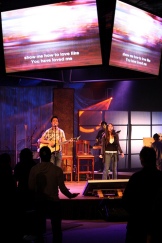Daniel DK Kim just gave up his dream job.
As the worship leader at Newsong Church in Irvine, California, DK has been living out a personal dream. And yet, on June 15th, DK, his wife Sadie and their young son Micah will be moving to Mexico City for two years, “to do our part in the abolition movement while working with and raising up a generation of indigenous artist/activists in the city to lead the charge… until we see the end of slavery.”
In our NG.AC community, we want to highlight stories of people courageously answering God’s call to do justice, love mercy, and walk humbly with God. As you can see from DK’s story, which we will share in two parts, this awakening to the intimate connection between worship and justice is both beautiful and challenging.
__________________
How would you describe the connection between worship and justice in your life? What have been some pivotal moments in shaping your understanding of worship and justice?

Photo by Scott Hodge at The Idea Camp in Irvine, California
I’ve been a worship leader since I was 15 years old, but it wasn’t until recently, in 2007, that I began to feel discontent in the way that I viewed and experienced worship. So much of our worship can become self-focused and self-indulgent if we forget about the call beyond the mere words of any song. I began to discover the synonymy of worship & justice in a few key passages of Scripture.
Isaiah 58 is a huge one for me: the challenge to consider what true fasting is made me think about what true worship is. “Is not this the kind of fasting I have chosen: to loose the chains of injustice and untie the chords of the yoke, to set the oppressed free and break every yoke?”
I began to see that my worship was just ritual if I didn’t take it outside of a fifteen-minute set list. I wanted desperately to do something about this unfolding realization but didn’t know where to start. All I could do was pray.
Continue reading →



